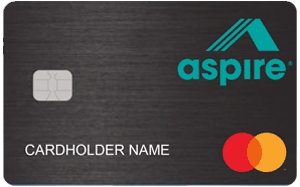Is the Aspire® Credit Card Worth It?
No, the Aspire® Credit Card is not worth it. Although you can sign up without paying any account-opening fees or deposit money upfront, there are several other considerations you should look at before you decide whether to get this card:
- You’ll pay a fortune in fees: Because this card usually has annual fees, and also has monthly fees after the first year, you’ll pay a lot just for the privilege of owning it—possibly as much as $208 a year.
- Your credit limit may or may not be high: For your initial credit limit, you might get up to $1,000, with the exact limit depending on your creditworthiness (unlike with secured cards, where it depends on the deposit you pay). What’s more, you can’t make a request to increase your credit card limit later, although automatic credit limit increases are apparently available.
- Interest rates are steep: The purchase APR of 22.74% – 36.00% (variable) is potentially so high that your interest charges will be huge if you don’t pay off your entire balance every month.
- Better unsecured cards are available for bad credit: With high fees and no rewards, the Aspire® Credit Card has little to recommend it. However, there are unsecured cards for poor credit with lower fees than the Aspire card charges or even with cashback rewards and other benefits. This means it’s definitely worth shopping around before you commit to an Aspire card.
Pros & Cons
Pros:
- No security deposit required
- No account-opening fees
- Potential for credit limit increases
- Foreign transactions, cash advances, and balance transfers available
Cons:
- Potentially very high APR
- $49–$175 annual fee in the first year
- Up to $49 annual fee in the second year
- Monthly account maintenance fees of $5–$12.50 after the first year
- No rewards
Who Is the Aspire® Credit Card Best For?
We really don’t recommend the Aspire® Credit Card, as there are less expensive and still accessible options out there. We only recommend you consider the card if you:
- Got an offer in the mail and are out of other options: If you’ve applied for other credit cards and haven’t had any luck qualifying, it could be time to turn to the Aspire® Credit Card. If you received a pre-qualified offer in the mail, it’s likely you’ll be approved for the card, so this may be a good last resort if you’re in desperate need of credit.
Alternative Cards
 |  |  |
Aspire® Credit Card | PREMIER Bankcard® Mastercard® | Petal 1 Visa® |
| Apply Now | Apply Now | Apply Now |
| Annual Fee $49–$175 in the first year (then $0–$49) | Annual Fee $50–$125 the first year ($45–$49 after that) | Annual Fee $0 |
| Credit Limit $0 – $1,000 | Credit Limit $200 – $700 | Credit Limit $300 – $5,000 |
| Credit Score 300 – 669 | Credit Score 500 – 669 | Credit Score 300 – 669 |
| Purchase APR 22.74% – 36.00% (variable) | Purchase APR 36.00% (fixed) | Purchase APR 22.99% – 32.49% (variable) |
What the Crowd Says
There aren’t many customer reviews specifically for the Aspire® Credit Card, and there are no professional reviews at all (only reviews for the cashback version of the card). Based on what cardholders think, this card gets a poor rating of 2.1.
Here’s how the two sites with cardholder reviews scored the card:
| Publication | Rating |
|---|---|
| Credit Karma (user ratings) | 1.2/5 |
| ConsumerAffairs (user ratings) | 3.2/5 |
| Aggregate rating: 2.2 |
What Major Publications Say
As of 12 January, 2023, there are no accurate reviews by major publications focusing specifically on the Aspire® Credit Card. A couple of reviews feature the cashback version of the card, but there’s nothing on its more basic sibling.
What Cardholders Say
Cardholder reviews for the Aspire® Credit Card are generally very negative. Although people make a few positive comments here and there, these are mostly negated by negative comments (e.g., a few people describe good customer service experiences, but many more describe bad experiences).
Here’s what cardholders are saying online.
Compliments:
- N/A
Complaints:
- Expensive fees
- Many recipients of pre-approved offers had applications declined
- Lack of credit limit increase opportunities
- Bad customer service
- Card takes a long time to arrive
- Account closed for insufficient use
- Problems with autopay
- Card locked unexpectedly
The consensus is that this card is best avoided, and there are a number of very worrying problems that crop up repeatedly.
Accounts Closed for Insufficient Use
A huge number of customers are angry that their Aspire® Credit Card accounts were closed because they allegedly didn’t use their card enough. Some say this happened even when they’d been making payments to their account (but not using it for purchases).
The customers who had this issue received no warning that their accounts would be closed, so it resulted in problems like declined payments.
Card Takes Too Long to Arrive
Many customers complain that Aspire’s cards took several weeks to arrive or, in some cases, never arrived at all. Some say this happened repeatedly; they called customer service to complain that their card hadn’t arrived and were told that they’d get a new one, but that card also never arrived.
Many of these customers claim that they ended up being charged fees for a card they hadn’t actually received, and were very angry that customer service didn’t resolve the issue.
Problems with Autopay
Multiple customers complain that their automatic payments were taken on the wrong day or not taken at all, causing problems like late fees and late payments on their credit reports.

Rates & Fees
Fees
Fees:
While the card has a range of functions (including cash advances and foreign transactions), there are fees attached to every one of them—there’s even a fee for adding an authorized user. Worst of all, there are annual fees for the first year and possibly after that, as well as monthly fees starting in the second year.
- Annual fee: $49–$175 in the first year; then $0–$49
- Monthly fees: None for the first year; then $5–$12.50 per month ($60–$159 per year)
- Balance transfer fee: 3% after the first year
- Cash advance transaction fee: $5 or 5% (whichever is greater)
- Foreign transaction fee: 3%
- Late payment fee: Up to $41
- Returned payment fee: Up to $41
- Authorized user fee: $19 one-off fee
Overall, this card has extremely high fees. It can cost you up to $175 in the first year and $208 every year after that. You’ll be paying these fees just for keeping the account open—with no rewards or refunds to offset the cost.
Interest Rates
APR:
The card has a wide range of potential interest rates. If you get offered an APR on the high end (which is likely if you have poor credit), leaving a balance on your credit card will result in very expensive interest charges.
- Purchase APR: 22.74% – 36.00% (variable)
- Balance transfer APR: 25.74% – 36.00% (variable)
- Cash advance APR: 25.74% – 36.00% (variable)
- Penalty APR: N/A
- Minimum interest charge: $1
If you don’t pay off your Aspire® Credit Card balance in full each month, you’ll be charged interest. The interest you’ll pay on your credit card depends on your APR (“annual percentage rate”).
The terms state that you can either be offered a fixed APR (your rate won’t change based on the prime rate) or a variable APR (your rate will change based on the prime rate). However, they don’t specify how they determine which type of interest rate you’ll be offered.
Rewards
Rewards:
The Aspire® Credit Card doesn’t offer rewards. Considering the high cost of annual and monthly fees, having no rewards to offset those charges is a major downside.
Many rewards cards are not available to applicants with poor credit or limited credit histories. However, cards with cash back for lower credit scores do exist. So if rewards are important to you, it’s worth continuing your search for the right card. Keep in mind that rewards cards for bad credit tend to require a security deposit.
Credit Limit
Credit Limit:
The card’s credit limit can only ever go as high as $1,000, with no minimum specified. This is a fairly low limit, which both reduces your spending power and makes improving your credit score more difficult.
One factor in calculating your credit score is how much available credit you’re using at a time. If you have a higher limit, it’s easier to keep this number low (which is good for your credit score). Unfortunately, the Aspire® Credit Card’s maximum limit of $1,000 doesn’t leave a lot of room for borrowing within a healthy range (ideally, you should use 30% or less of your credit limit at a time).
Credit Limit Increases
Unfortunately, Aspire says that you can’t request a credit limit increase. However, you may be able to get an automatic increase. Whether you’ll be offered one depends on factors like whether you’ve:
- Made timely payments
- Stayed within your credit limit
- Maintained your credit score
- Avoided black marks on your credit report
Benefits
The Aspire® Credit Card offers a very basic package of benefits:
| Benefit | What It Means |
|---|---|
| Free credit scores | Get free VantageScore 4.0 scores starting 60 days after your account is opened. |
| Zero fraud liability | You won’t be held responsible for any unauthorized transactions made with your credit card or credit card numbers. |
| Account alerts | Get free account alerts when any suspicious activity is detected on your card. |
| 24/7 access | Enjoy 24/7 access to your online account on any device so you can monitor your activity. |
Credit Reporting
Credit Reporting:
Credit reporting is an important part of building credit, as your credit score is based on the information your lenders send to the credit bureaus (which then appears on your credit report). Unfortunately, it’s unclear how many credit bureaus the Aspire® Credit Card issuer reports to.
As they offer free TransUnion credit reports, it seems likely that the Aspire® Credit Card issuer at least reports to TransUnion. However, reporting to the three major credit bureaus is ideal for credit building.
Even if Aspire doesn’t report your on-time payments to the bureaus, it will be likely to report late payments. As such, you should keep up with your monthly payments so that your credit doesn’t suffer.
How to Get the Aspire® Credit Card
Credit Score Requirements
The Aspire® Credit Card says that you can qualify with less-than-perfect credit. This means that you may still be eligible if you have poor, fair, or limited credit.
How to apply for the Aspire® Credit Card
To get an Aspire® Credit Card, you can:
- Respond online to a pre-qualified offer you received in the mail.
- Apply for pre-qualification online.
To apply, you will need to provide personal information, including your Social Security number and residential address.
FAQs
Does Aspire do a hard credit pull?
Yes, Aspire will do a hard credit pull when you apply. Also known as a hard inquiry or hard credit check, this is a mark that appears on your credit report whenever you apply for credit. It will temporarily knock a few points off your credit score.
They may also do an income check, for which Aspire might access your bank account information.
What bank issues the Aspire® Credit Card?
The Bank of Missouri issues the Aspire® Credit Card.
Does the Aspire® Credit Card have a grace period?
The Aspire® Credit Card gives you a 25-day grace period (beginning on the first day of the new billing cycle). The grace period allows you time to pay your bills in full without racking up any interest charges.
If you pay your bills in full by the due date, your purchases during the grace period won’t accumulate interest. However, if you carry a balance from previous billing cycles, you’ll have to pay interest on any charges you make to your card in the grace period.
Can I use the Aspire® Credit Card for a cash advance?
You can use your Aspire® Credit Card to borrow cash through ATM withdrawals. When you do this, it’s called a cash advance.
However, there are fees and interest rates for this service. The Aspire® Credit Card has cash advance fees of either $5 or 5% of the amount of each cash advance—whichever is greater. The APR for cash advances is 25.74% – 36.00% (variable).
Can I make a balance transfer on the Aspire® Credit Card?
The Aspire® Credit Card offers balance transfers—the ability to move debt from a different credit card to your Aspire card. Transferring debts from one credit card to another in this way is a common form of debt consolidation.
After the first year of card ownership, the Aspire® Credit Card balance transfer fee is 3% of the transfer amount. Unfortunately, unless you have debts on another credit card with an even higher APR, it’s not a good card for balance transfers, as the balance transfer APR is incredibly high at 25.74% – 36.00% (variable).
Can I use the Aspire® Credit Card abroad?
Yes, you can use the Aspire® Credit Card abroad. However, you’ll have to pay to do so.
Many cards have foreign transaction fees equivalent to 1%–3% of the transaction amount. The Aspire® Credit Card has a fee of 3%, which is within the standard range, but if you make a lot of foreign transfers, the costs will start to mount up.
As such, borrowers who plan to use their card abroad a lot or who shop on non-US websites should look for no-foreign-transaction-fee credit cards instead.
Where can I use my Aspire® Credit Card?
You can use the Aspire® Credit Card anywhere Mastercard is accepted. This means it can be used almost anywhere that accepts credit card payments.
How do I contact customer service for the Aspire® Credit Card?
For help with your Aspire® Credit Card—including if your card is lost, stolen, or used without your permission—you can call the customer service phone number at (855) 802-5572. You can also send a text to the same number.
Alternatively, you can use their online form to send them a message.
For mail correspondence, use the following postal address:
Account Services
P.O. Box 105555
Atlanta, GA 30348-5555
How We Rate Our Cards
Every card we review is rated on a 5-star rubric that's unique to the card's intended audience. A card's final rating will be based on factors like its:
- Fees
- Interest Rates
- Rewards
- Credit Limit
- Accessibility
- Benefits
Our rubrics are completely transparent and open to alterations as advised by you, our readers. Join us on Discord if you have thoughts to share about how we rate and review credit cards.








